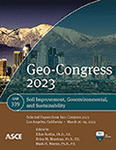Constant Curing Temperature Effect on the Strength of Cement-Treated Soil
Publication: Geo-Congress 2023
ABSTRACT
The wet method of deep mixing constructs soil-cement columns by mixing soft soil with cement-water slurry to improve the ground. A research project is underway to investigate factors that control the strength of soil improved by cement and to develop a framework for quantitatively accounting for these factors. As a first step of the project, this paper presents unconfined compressive strength (UCS) test results for cement-treated soil with different mix proportions cured at various constant temperatures. A fabricated low plasticity clay (CL) was blended with cement-water slurry and cured in an environmental chamber at low temperatures (–5, 0, and 5°C); other samples were cured inside a temperature-controlled water bath at a high temperature (45°C). Reference samples were cured in a humidity-controlled room at room temperature (21.1°C). UCS tests were conducted on the cured samples at curing times of 3, 7, 14, and 28 days. The test results show that when a curing temperature is 0°C or higher, an increase in temperature increases the strength of cement-treated soil. Furthermore, the strength rapidly increases at early curing stages and slowly increases at later curing stages. The strength development trends are affected not only by curing time and temperature but also by mix proportions. Cement-treated soil with more cement and less water had a concave curve in the curing temperature and UCS relationship, such that strength increases with increasing curing temperature rapidly at a low-temperature range and slowly at a high-temperature range, while a convex curve was observed for the mixture with less cement and more water. At a freezing temperature (–5°C), the strength development with curing time was not remarkable, and strength drops and relatively significant scatters were observed from the mixtures with more cement and less water.
Get full access to this article
View all available purchase options and get full access to this chapter.
REFERENCES
Åhnberg, H., and Holm, G. (2017). “Stabilization of some Swedish organic soils with different types of binder.” Dry Mix Methods for Deep Soil Stabilization, Routledge, 101–108.
ASTM. (2011). Standard Practice for Classification of Soils for Engineering Purposes (Unified Soil Classification System). D2487-11, ASTM International, West Conshohocken, PA.
ASTM. (2016). Standard Test Method for Unconfined Compressive Strength of Cohesive Soil. D2166/D2166M-16, ASTM International, West Conshohocken, PA.
Babasaki, R., Suzuki, K., Saitoh, S., Suzuki, Y., and Tokitoh, K. (1991). “Construction and testing of deep foundation improvement using the deep cement mixing method.”, Publ by ASTM, 224–233.
Bruce, M. E. C., Berg, R. R., Filz, G. M., Terashi, M., Yang, D. S., and Collin, J. G. (2013). Federal Highway Administration Design Manual: Deep Mixing for Embankment and Foundation.
Chai, M., Zhang, H., Zhang, J., and Zhang, Z. (2017). “Effect of cement additives on unconfined compressive strength of warm and ice-rich frozen soil.” Construction and Building Materials, Elsevier, 149, 861–868.
Chitambira, B., Al-Tabbaa, A., Perera, A. S. R., and Yu, X. D. (2007). “The activation energy of stabilised/solidified contaminated soils.” Journal of Hazardous Materials, Elsevier, 141(2), 422–429.
Clare, K. E., and Pollard, A. E. (1954). “The Effect Of Curing Temperature On the Compressive Strenght Of Soil-Cement Mixtures.” Géotechnique, 4(3), 97–106.
Hirabayashi, H., Taguchi, H., Tokunaga, S., Shinkawa, N., Fujita, T., Inagawa, H., and Yasuoka, N. (2009). “Laboratory Mixing Tests on Cement Slurry Preparation, Specimen Preparation and Curing Temperature.” International Symposium on Deep Mixing and Admixture Stabilisation.
Hodges, D. K., Filz, G. M., and Weatherby, D. E. (2008). Laboratory mixing, curing, and strength testing of soil-cement specimens applicable to the wet method of deep mixing.
Jacobson, J. R., Filz, G. M., and Mitchell, J. K. (2003). Factors Affecting Strength Gain in Lime-Cement Columns and Development of a Laboratory Testing Procedure. Virginia Center for Transportation Innovation and Research.
Ju, H. (2019). Influence of Curing Temperature on Strength of Cement-treated Soil and Investigation of Optimum Mix Design for the Wet Method of Deep Mixing.
Kido, Y., Nishimoto, S., Hayashi, H., and Hashimoto, H. (2009). “Effects of Curing Temperatures on the Strength of Cement-treated Peat.” International Symposium on Deep Mixing and Admixture Stabilisation, 1–4.
Kitazume, M., and Terashi, M. (2013). The Deep Mixing Method. The Deep Mixing Method, CRC Press.
Nevarez-Garibaldi, R., Miller, D., and Filz, G. (2018). Influences of Mixture Proportions and Test Conditions on the Strength and Stiffness of Wet-Mixed Soil and Cement,.
Porbaha, A. (1998). “State of the art in deep mixing technology: part I. Basic concepts and overview.” https://doi.org/10.1680/gi.1998.020204, Thomas Telford - ICE Virtual Library, 2(2), 81–92.
Sato, A., Nishimoto, S., and Suzuki, T. (2007). “Relationship between Curing Temperature and Strength of Stabilized Soil.” Proceedings of the International Conference on Cold Regions Engineering, American Society of Civil Engineers, 1–10.
Terashi, M. (1997). “Theme lecture: Deep mixing method- Brief state of the art.” Proc. of the 14th International Conference on Soil Mechanics and Foundation Engineering, 2475–2478.
Wang, D., Zentar, R., and Abriak, N. E. (2016). “Temperature-Accelerated Strength Development in Stabilized Marine Soils as Road Construction Materials.” Journal of Materials in Civil Engineering, American Society of Civil Engineers, 29(5), 04016281.
Zhang, R. J., Lu, Y. T., Tan, T. S., Phoon, K. K., and Santoso, A. M. (2014). “Long-Term Effect of Curing Temperature on the Strength Behavior of Cement-Stabilized Clay.” Journal of Geotechnical and Geoenvironmental Engineering, American Society of Civil Engineers, 140(8), 04014045.
Information & Authors
Information
Published In
History
Published online: Mar 23, 2023
Authors
Metrics & Citations
Metrics
Citations
Download citation
If you have the appropriate software installed, you can download article citation data to the citation manager of your choice. Simply select your manager software from the list below and click Download.
